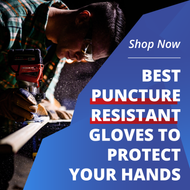We know that your hands play a vital role in allowing you to do your job effectively and efficiently. Not only are they responsible for operating heavy machinery, assembling complex systems, and constructing buildings and infrastructure, your hands are the tools that allow you to be productive and safe on the job.
That’s why we’ve put together this list of the best puncture resistant gloves designed to protect this asset, even in hazardous environments.
Puncture-resistant gloves are designed to provide protection against sharp objects that could potentially puncture or cut the skin. They are often made with materials that are resistant to cuts and punctures, such as Kevlar or steel wire. These materials can withstand the force of a sharp object, such as a needle or a piece of glass, and prevent it from penetrating the glove and potentially injuring the wearer's hand.
Beyond physical protection, puncture-resistant gloves can also help reduce the risk of infection from puncture wounds. Many occupations, such as healthcare or waste management, involve handling materials that may be contaminated with blood or other bodily fluids. Wearing puncture-resistant gloves can help prevent accidental exposure to these contaminants.
When it comes down to it, puncture-resistant gloves are an important safety measure for workers who may be at risk of wounds due to the nature of their work.
Overall Best Puncture Resistant Gloves

The Tenactiv™ S21TXUFN sets a new standard in hand protection. As the world's first 21-gauge glove, it delivers unbeatable cut protection while retaining a natural, bare-hand feel. With its ultra-thin nitrile palm coating, you get a strong grip that won't slip, even on touchscreens. And, unlike other gloves, it doesn't sacrifice flexibility for protection. Say goodbye to bulky gloves and hello to ultimate protection with the Tenactiv™ S21TXUFN.
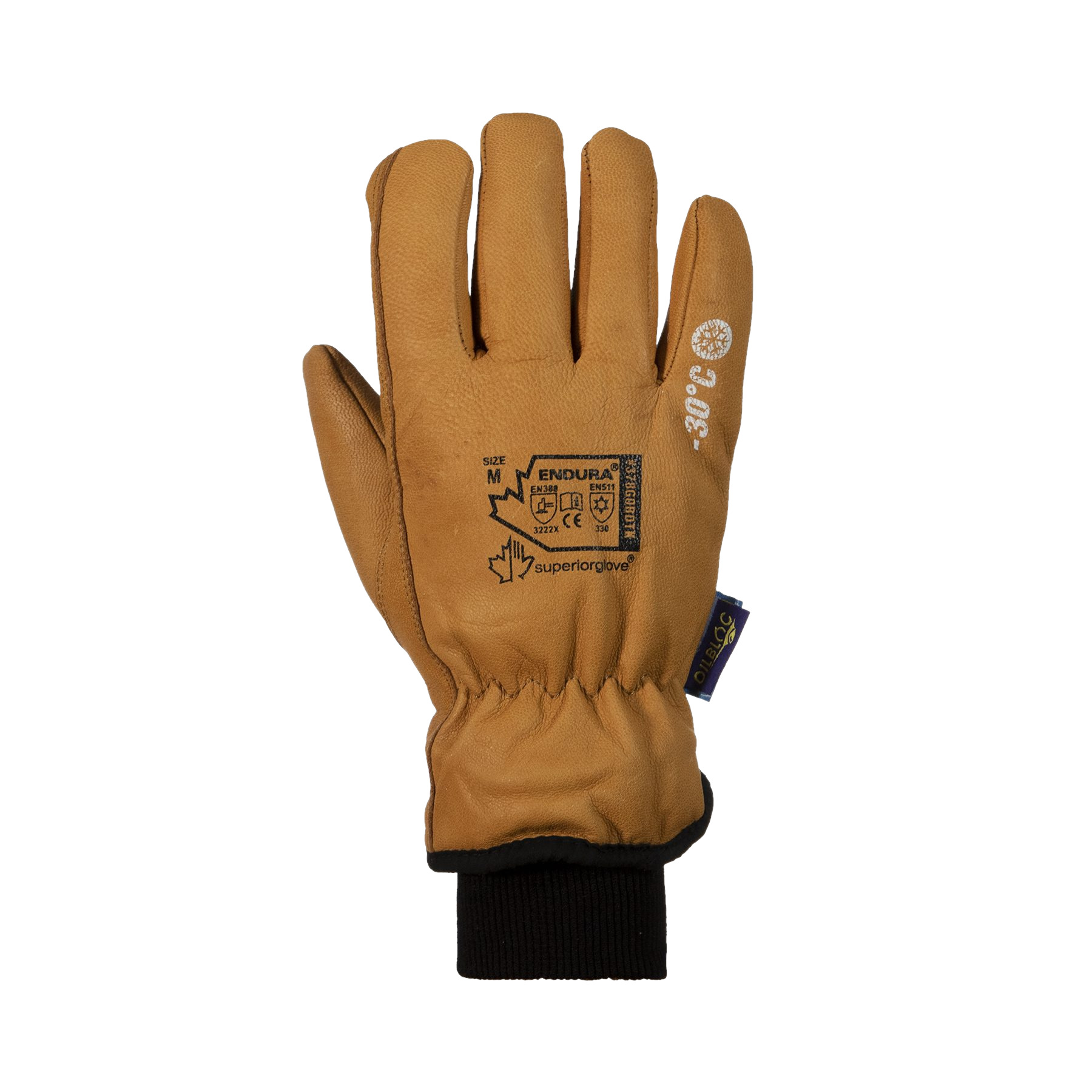
Made from a tough goat-grain leather that provides ANSI Level 4 puncture resistance, Endura® 378GOBDTK gloves by Superior Glove also feature a protective knitwrist turtleneck cuff extension further locks in warmth. Perfect for construction, oil & gas, and utilities workers, these puncture-resistant, oil and water repelling gloves work well in extreme cold keeping hands warm in temperatures down to -30°C / -22°F. They are recommended for general labor, maintenance, material handling, and outdoor winter work.
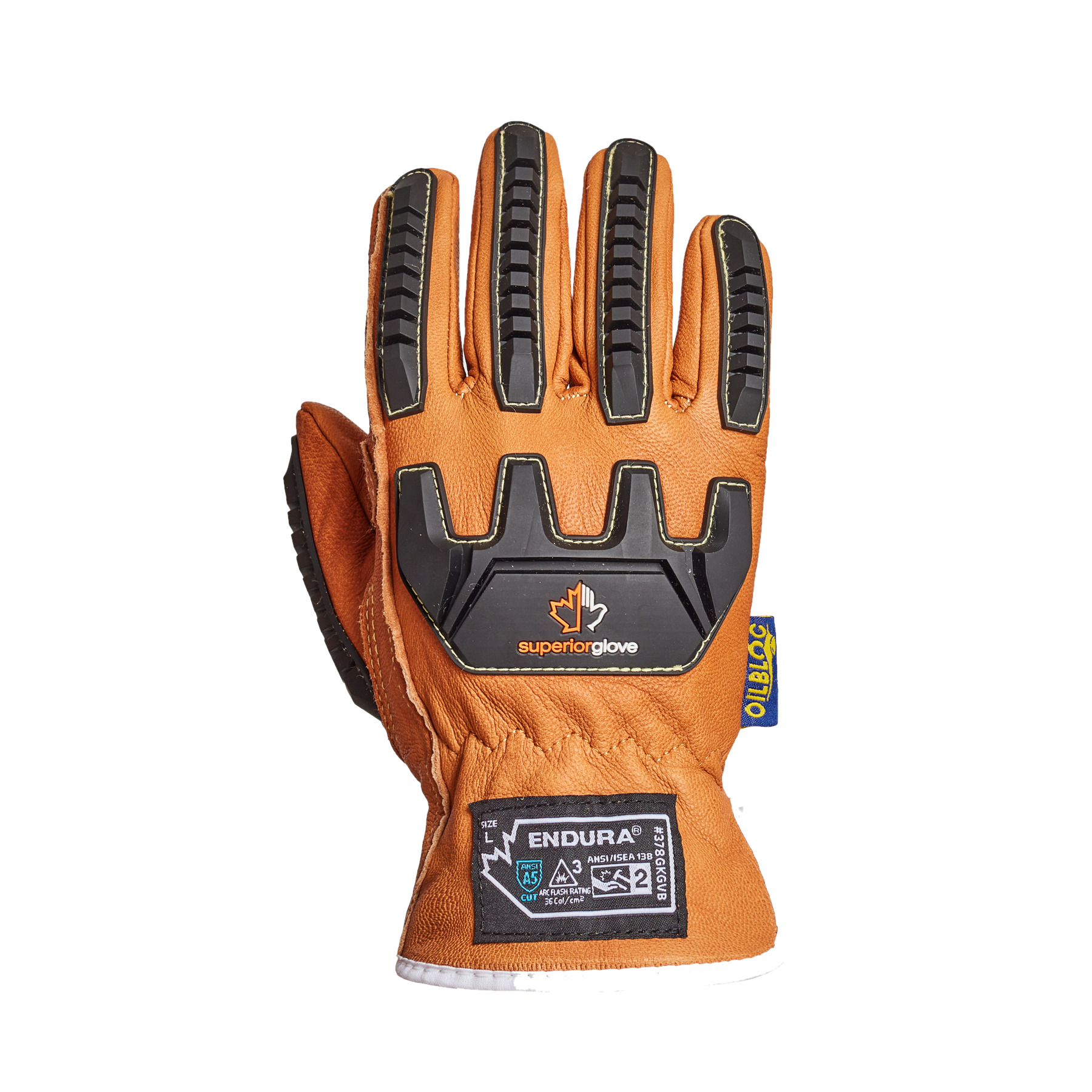
Endura Arc Flash Cut Resistant Goatskin Driver Gloves (378GKGVB)
These tough goatskin gloves provide reinforced back-of-hand protection against knocks and bumps and a DuPont Kevlar fiber/composite filament fiber lining that offers 360° ANSI Level A5 cut protection. The 378GKGVB by Superior Glove protects hands without impeding flexibility or dexterity. A level 3 Arch Flash testing rating ensures protection from sparks and flame. They’ve also received an Oilbloc treatment to prevent oils and liquids from soaking into the leather, and a padded palm to boost durability while suppressing vibrations.
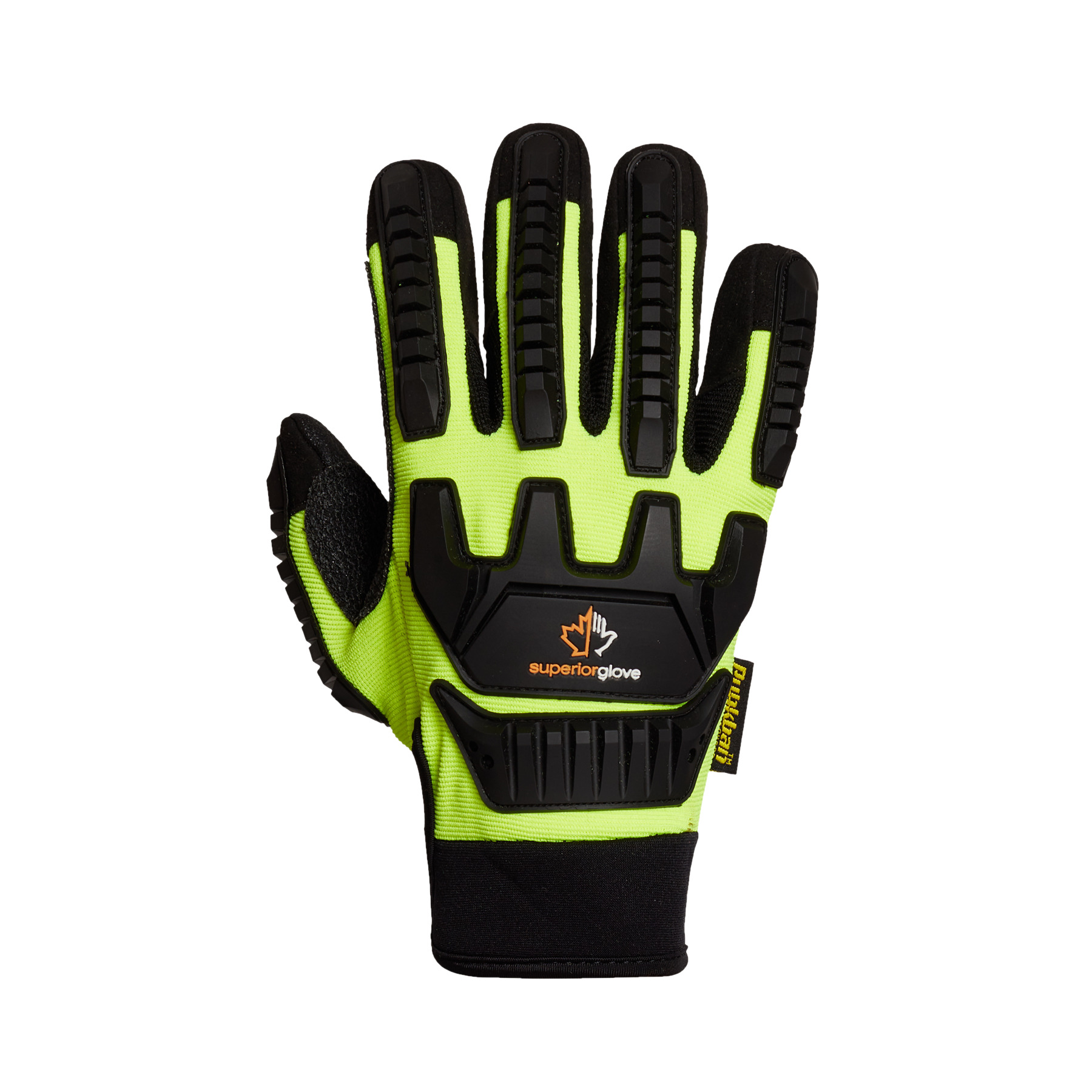
Clutch Gear Anti Impact Cut & Puncture Resistant Punkban Lined Mechanics Gloves (MXVSBPB)
A good fit for landscaping, metal fabrication, municipality, and the oil & gas sector, the strategically placed thermoplastic rubber pads at the back of the hand provide these mechanic gloves with a high level of impact resistance—without sacrificing mobility. Their PVC Sure Grip® palm patches ensure a strong, steady grip while protecting fingertips, and DuPont™ Kevlar® fiber reinforced thumb patches extend their lifespan. Punkban™ lining provides these gloves with ANSI Level 4 puncture resistance. These dexterous puncture and cut resistant gloves by Superior Gloves are also ANSI Level A4 cut resistant. They are recommended for material and parts handling, site cleanup, and vegetation clearing.
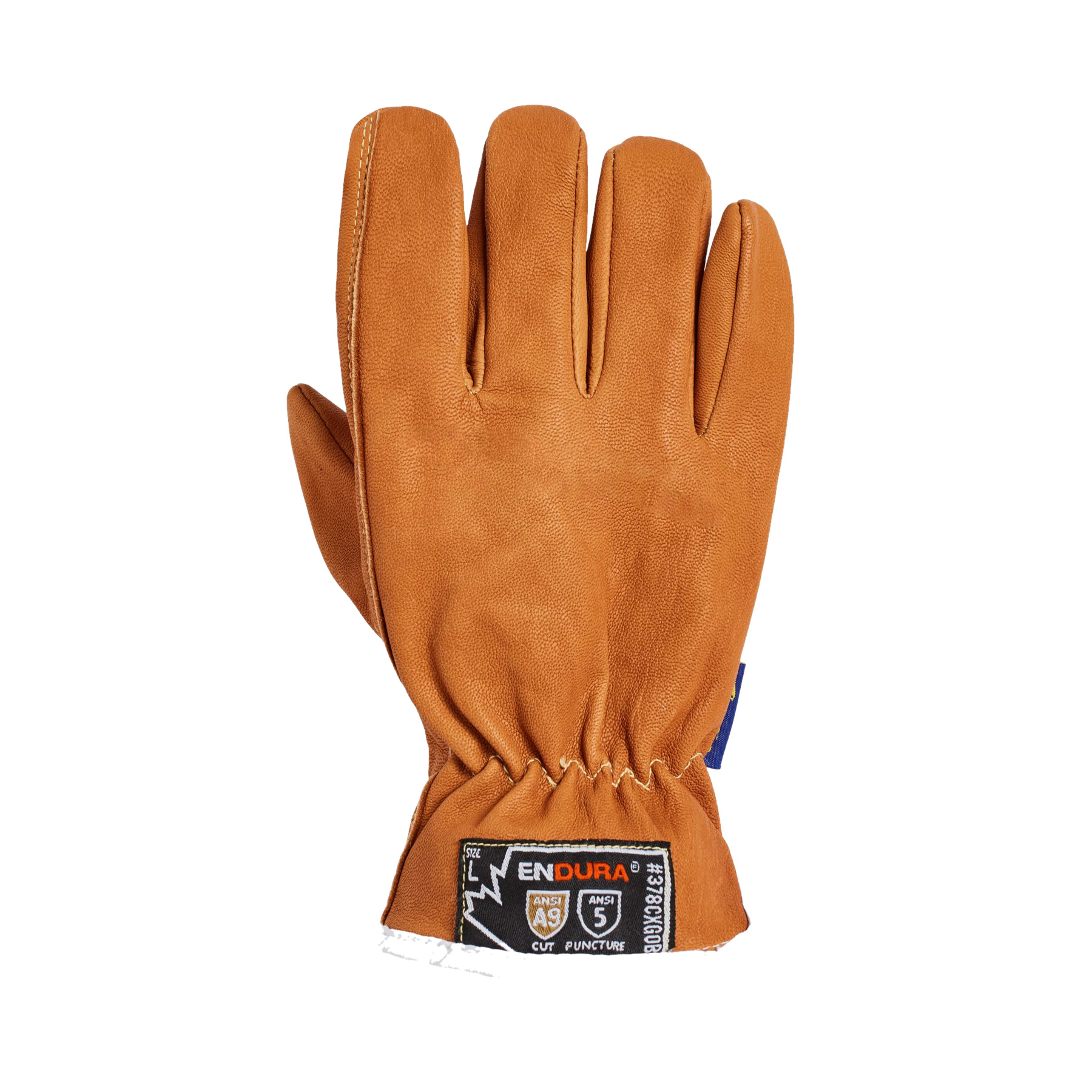
Endura Extreme Cut Resistant Kevlar Steel and Poly Lined Oilbloc Goatskin Gloves (378CXGOB)
These ultra-abrasion-resistant goatskin gloves by Superior Glove are your first line of defense against punctures and cuts if your job includes changing and sharpening blades, glass handling, material handling, metal stamping, and more. The 378CXGOB gloves have a lining made from a blend of para-aramid and wire-core provides 360° ANSI Level A9 cut protection. They also provide ANSI Level 5 protection from punctures. An Oilbloc treatment resists oil and water to prevent slips when safety matters most.
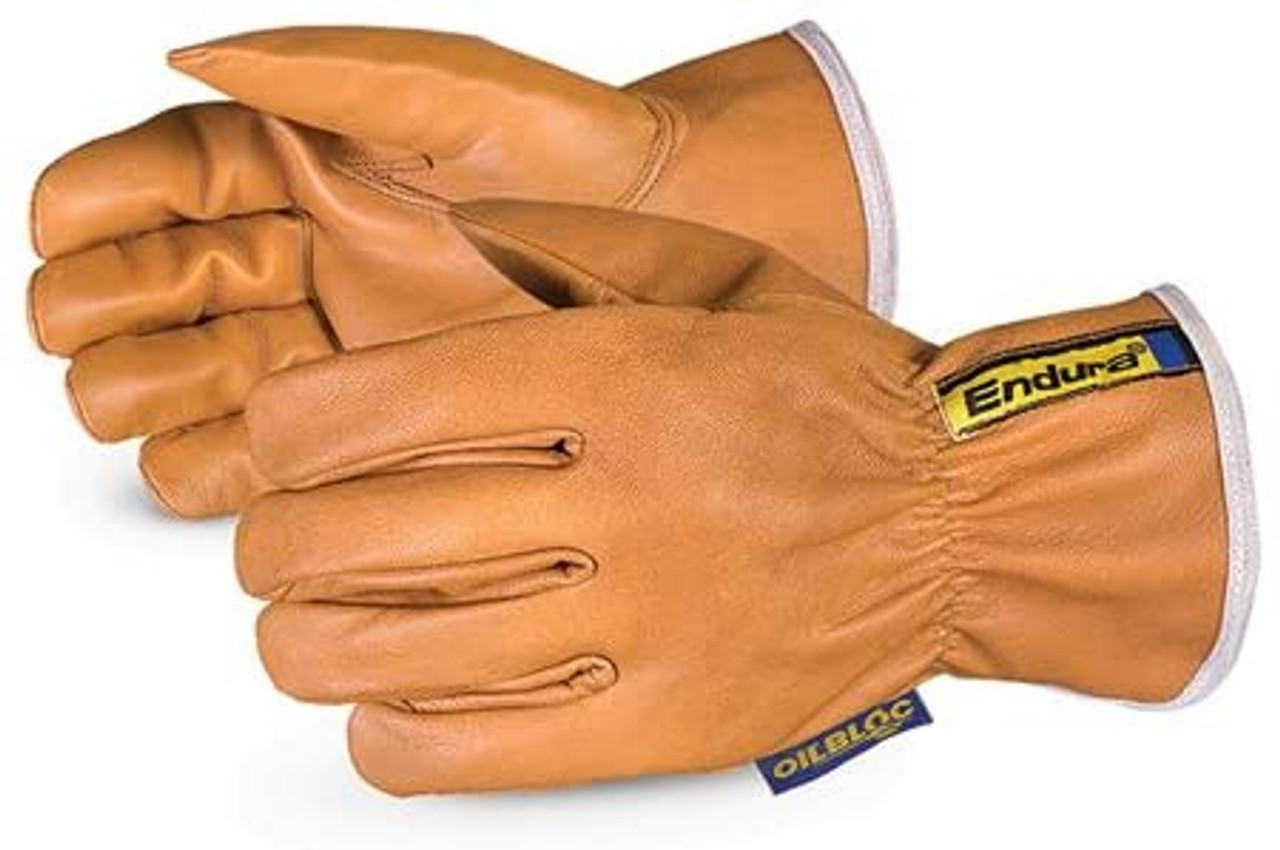
Endura Superior Goatskin Gloves (378GOBKL)
The tough, multi-use Endura 378GOBKL Superior supple goatskin gloves provide cut and arc flash protection with ANSI Level A4 cut resistance and a Level 4 arch flash rating. Goatskin is prized for its high tensile-strength and abrasion-resistant properties and is often referred to as nature's strongest leather. Processed with Superior's own Oilbloc treatment for exceptional water and oil repellency, oil will not soak through the Superior Glove Endura 378GOBKL. Applications for the Superior glove 378GOBKL include automotive, steel mills, metal stamping, parts, material handling, maintenance, petroleum industry, manufacturing, industrial, construction, forklift, truck drivers, farm equipment, mining and utilities.
What to Look for When Buying Puncture Resistant Gloves?
We understand the importance of finding gloves that will protect the hands of industrial, utility, and construction workers from punctures, cuts, and other hazards on the job. Our appreciation for what you do is why we’ve pulled together a few key things to consider:
- Material: The material of the gloves is important because it determines their level of puncture resistance. Look for gloves made of materials like kevlar, leather, or nylon, as these are all known to be puncture resistant.
- Rating: Many puncture resistant gloves come with a rating that indicates the level of puncture resistance they provide. It's important to choose a glove with a rating that meets your needs.
- Fit: Proper fit is essential for ensuring that the gloves provide the protection they're intended to. Make sure the gloves fit snugly and are not too loose or too tight.
- Comfort: Look for gloves that are comfortable to wear for extended periods of time, as you may need to wear them for long periods of time depending on your job or activity.
- Durability: Choose gloves that are built to last and can withstand the rigors of your job or activity. Look for gloves that are made of high-quality materials and have reinforced fingertips or other durable features.
- Cost: Investing in high-quality gloves may save you money in the long run by reducing the need for frequent replacements.
- Certification: Some puncture resistant gloves may be certified to meet specific standards, such as those set by the American Society for Testing and Materials (ASTM) or the European Committee for Standardization (CEN). If you are in a regulated industry, it may be important to choose gloves that are certified to meet certain standards.
Keeping these factors in mind will help you to find puncture resistant gloves that offer the protection you need at a price you can afford.
What are Puncture Resistant Gloves Used for?
Puncture resistant gloves are designed to protect your hands from sharp objects that could puncture the skin. They are commonly used in a variety of industries and settings, including:
- Construction: Workers in the construction industry may wear puncture resistant gloves to protect their hands from sharp objects such as nails, screws, and shards of metal or glass.
- Industrial: Many industrial workers, such as those in manufacturing or assembly, may wear puncture resistant gloves to protect their hands from sharp objects in the workplace.
- Medical: Medical professionals, such as nurses and doctors, may wear puncture resistant gloves to protect their hands from sharp objects such as needles or scalpels.
- Food handling: Food handlers may wear puncture resistant gloves to protect their hands from sharp objects like bones or broken glass while handling food.
- Law enforcement: Police officers often wear puncture resistant gloves to protect their hands from sharp objects such as needles or broken glass when searching suspects or responding to crime scenes.
- Recreational activities: Some recreational activities, including rock climbing or mountain biking, may involve the risk of puncture injuries. In these cases, puncture resistant gloves can provide an extra layer of protection for the hands.
Do Cut Resistant Gloves Protect Against Punctures?
While cut resistant gloves are designed to protect the hands from cuts and abrasions caused by sharp objects, they may not provide the same level of protection against punctures as puncture resistant gloves.
Puncture resistant gloves are specifically designed to protect your hands from sharp objects that could puncture the skin, such as needles, nails, or shards of glass. They typically have a higher level of puncture resistance than cut resistant gloves.
It's important to carefully read the product descriptions and ratings of any gloves you are considering to best determine their level of protection against cuts, abrasions, and punctures.
What is a Pair of Puncture-Resistant Gloves
Puncture-resistant gloves are a type of personal protective equipment (PPE). Because of this, they are often the glove of choice commonly used in a variety of industries and settings, including law enforcement, construction, industrial work, medical settings, food handling, and recreational activities that may involve the risk of puncture injuries.
Puncture-resistant gloves are commonly used in a variety of industries and settings, including law enforcement, construction, industrial work, medical settings, food handling, and recreational activities.
Puncture-resistant gloves typically come in a range of sizes to ensure a proper fit and may also have features such as reinforced fingertips or padded palms for additional protection and comfort. They may also have a rating that indicates the level of puncture resistance they provide, with higher ratings indicating a greater level of protection.
How Do Puncture-Resistant Gloves Work
Puncture-resistant gloves work by providing a barrier between the hands and sharp objects that could puncture the skin. The gloves are made of materials that are resistant to puncture, such as Kevlar, leather, or nylon, which helps to prevent sharp objects from penetrating the gloves and reaching the skin.
Puncture-resistant gloves with additional features like reinforced fingertips or padded palms can help to absorb the impact of sharp objects and provide additional protection against punctures.
We think it’s important to note that puncture-resistant gloves are not completely foolproof and can still be punctured under certain circumstances. However, they can significantly reduce the risk of puncture injuries and provide an extra layer of protection for the hands.
Types of Puncture-Resistant Gloves
There are several types of puncture-resistant gloves available on the market, each with its own specific features and benefits. Below, we’ve provided some common types of puncture-resistant gloves:
- Kevlar gloves: Kevlar is a synthetic fiber that is known for its high level of strength and puncture resistance. Kevlar gloves are often used in law enforcement and other settings where puncture resistance is a top priority.
- Leather gloves: Leather gloves can provide good puncture resistance, particularly if they are thick and well-made. They may not be as puncture resistant as Kevlar gloves, but they are often more durable and can provide good protection against cuts and abrasions as well.
- Nylon gloves: Nylon gloves can provide good puncture resistance and are often lightweight and flexible, making them a good choice for activities that require a high degree of dexterity.
- Disposable gloves: Disposable gloves, such as those made of nitrile or latex, are often used in medical settings and can provide good puncture resistance. They are designed to be worn once and then disposed of, making them a convenient and hygienic option.
- Metal mesh gloves: Metal mesh gloves are made of a mesh of metal wires and can provide excellent puncture resistance. They are often used in food handling and other settings where sharp objects are a concern.
It's important to choose the right type of puncture-resistant gloves for your specific needs and to follow the manufacturer's instructions for use to ensure the maximum level of protection.
H2 Why Do You Need Puncture-Resistant Gloves
Puncture-resistant gloves provide protection for a variety of needs. The most obvious of these being protection against puncture injuries. Wearing these gloves can significantly reduce your risk of sustaining puncture injuries and provide an extra layer of protection for the hands.
Puncture-resistant gloves also provide safety on the job. As we’ve mentioned, many occupations, such as construction, industrial work, and medical care, carry a risk of puncture injuries due to the presence of sharp objects in the workplace. Wearing puncture-resistant gloves can help to ensure the safety of workers in these industries.
Beyond the workplace, puncture-resistant gloves also are necessary for some recreational activities such as rock climbing, mountain biking, and more.
Care and Maintenance
Proper care and maintenance of puncture resistant gloves is important to ensure they continue to provide the level of protection they're intended to. To help you to use and maintain your investment, we’re providing some tips for caring for your puncture resistant gloves:
1. Follow the manufacturer’s instructions: Be sure to follow the care instructions provided by the manufacturer of your gloves. These instructions may include specific guidelines for cleaning, storing, and replacing gloves.
2. Clean and dry the gloves: After each use, be sure to clean and dry you gloves thoroughly. This can help to remove dirt, sweat, and other contaminants that can weaken the gloves over time.
3. Store the gloves properly: You’ll want to store your gloves in a cool, dry place when not in use. Avoid storing them in direct sunlight or in damp or humid conditions, as this can weaken the material and reduce their effectiveness.
4. Check for signs of wear and tear: Don’t forget to inspect your gloves regularly for holes, tears, or fraying. If you notice any damage, replace them as soon as possible to ensure the maximum level of protection.
5. Follow proper use guidelines: Always follow the guidelines for proper use of your gloves, such as avoiding contact with certain chemicals or sharp objects, to ensure that they last as long as possible.
Conclusion
Puncture-resistant gloves can help to protect your hands from sharp objects and reduce the risk of puncture injuries in a variety of settings. In certain situations, such as when handling hazardous materials or responding to emergency situations, puncture-resistant gloves can provide protection against accidental punctures.
We hope you now have a better understanding of how puncture-resistant gloves are an important piece of personal protective equipment that can help reduce the risk of puncture injuries and protect workers' hands in various settings. With these gloves, you can have peace of mind knowing you are protected while on the job.
Additional Resources
Safety Gloves ( https://www.safetygloves.co.uk/blog)
Superior Glove ( https://www.superiorglove.com/blog/)
FAQs
What materials are used to make puncture resistant gloves?
Puncture resistant gloves can be made from a variety of materials, including Kevlar, leather, or nylon.
Are puncture resistant gloves also cut resistant?
Not necessarily. While some gloves may have both puncture and cut resistance, others may only provide protection against one or the other.
How do I know if a glove is truly puncture resistant?
Look for gloves that have been tested and certified by a reputable organization, such as the American Society for Testing and Materials (ASTM) or the National Safety Council (NSC).
Can puncture resistant gloves protect against all types of punctures?
No, puncture resistant gloves may provide protection against certain types of punctures, such as those from needles or sharp objects, but may not protect against others, such as those from knives or blades.
Can puncture resistant gloves be used in different industries?
Yes, puncture resistant gloves can be used in a variety of industries, such as construction, healthcare, and law enforcement, where the risk of puncture injuries is present.
How often should I replace my puncture resistant gloves?
The frequency of replacement will depend on the level of use and the type of work being performed. It is recommended to inspect the gloves regularly for signs of wear and tear, and replace them when they no longer provide adequate protection.
How should puncture resistant gloves fit? What sizes are available?
In general, puncture resistant gloves should fit snuggly over the hand. An easy way to size your gloves is to measure around your hand above the V of the thumb which gives you the circumference in inches. Another option is to measure across and around the palm of your dominant hand with a tape measure. It's best to measure your hand and match it to the manufacturer's size chart.

